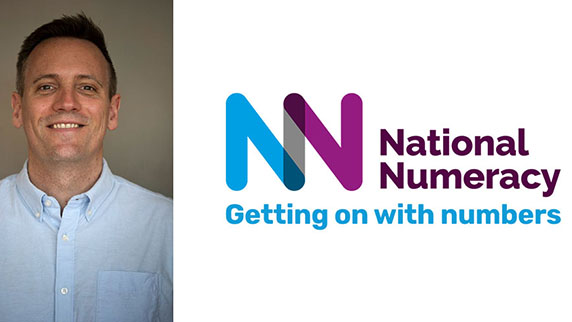
Fortnightly financial 5 minutes #9 Sam Sims
Nigel Yeates, Communications and Stakeholder Business Partner, speaks to Sam Sims, Chief Executive of National Numeracy, about how consumers can kick-start their confidence with numbers and how important this can be.
Can you tell us a little about National Numeracy and your role in the organisation?
Half of all adults in the UK only have the numeracy level expected of a primary school child. This blights lives and livelihoods and contributes to pervasive problems by increasing vulnerability to debt, unemployment and even poor health. Low numeracy is the single greatest consumer vulnerability and numeracy level is the strongest predictor of financial literacy.
At National Numeracy we empower adults and children to get on with numbers and fulfil their potential, helping to spark better opportunities and brighter futures.
I joined the charity in 2020 to lead a new strategy focusing on supporting people with the lowest numeracy, where the need is greatest.
Earlier this month you encouraged everyone to kick-start their confidence with numbers during Number Confidence Week. What is the week all about?
Having to do maths in everyday situations makes millions of people feel anxious. So, Number Confidence Week is all about empowering people to boost their numbers and maths confidence.
The campaign combines practical tools and resources, like the National Numeracy Challenge - our free confidence and skills building online tool - with our ‘confidence conversations’ video series, bumper kids activity pack and competitions supported by our fantastic celebrity ambassadors, such as Rachel Riley and Bobby Seagull. There is quite literally something for everyone, however you feel about numbers and maths, all available on our online hubs.
How important is it for people to improve their maths confidence and how much can this help in managing their money?
We know that improving confidence with numbers and maths is often the crucial first step towards improving our skills and, as a result, feeling better equipped throughout different areas of our lives.
Many people we support tell me that feeling more confident with numbers helps them better engage with their finances. It can help us feel more in control of our money and feel more equipped to make good decisions, such as what deal offers the best value for money. Perhaps most importantly, building number confidence can really open the door to improving our financial capability.
Can you tell us more about the free online resource that is the National Numeracy Challenge that you mentioned earlier?
Numeracy is not set in stone. We can all improve with practice. You can get started with the National Numeracy Challenge on any device in just 10 minutes. It supports you to develop your confidence and skills on your terms, in your own time. The Challenge is designed for adults and is all about the maths we use every day at home and at work.
The online tool tailors the questions you receive, so you only get the harder questions when you’re doing well with the easier ones. People tell us that it’s friendly and encouraging and they love the fact it is all about bite-sized learning, so you don’t get bogged down.
Now, on a more personal note, if £10,000 landed in your lap tomorrow, what would you do with it?
With half of all adults having low numeracy, the challenge we are working to address is huge. Yet, the impact of improving numeracy levels, both for individuals and society, would open up a wealth of opportunity. That’s why at National Numeracy we have big ambitions for the future. We want to reach and support more people who can benefit from our support in communities where the need is greatest across the country.
It costs National Numeracy as little as £15 to help someone in need of support to start improving their numeracy, which in turn could spark opportunities throughout their life. As we look to the future, £10,000 could go a long way in helping National Numeracy to expand our vital support and impact.
Thanks very much Sam for all those insights and we look forward to seeing the great work of National Numeracy continue to grow.
For more information on what FSCS protects, see our What we cover page.
We're always trying to simplify our processes for our customers and episode 8 of the FSCS podcast has a great summary of how to claim with FSCS in 3 steps.
The content of any discussions shouldn't be taken as an indication of future FSCS policy positions. The views expressed by guests are their own and don't reflect the views of FSCS.
We would also love everyone to dedicate a regular extra five minutes to check their financial products and services are FSCS protected.